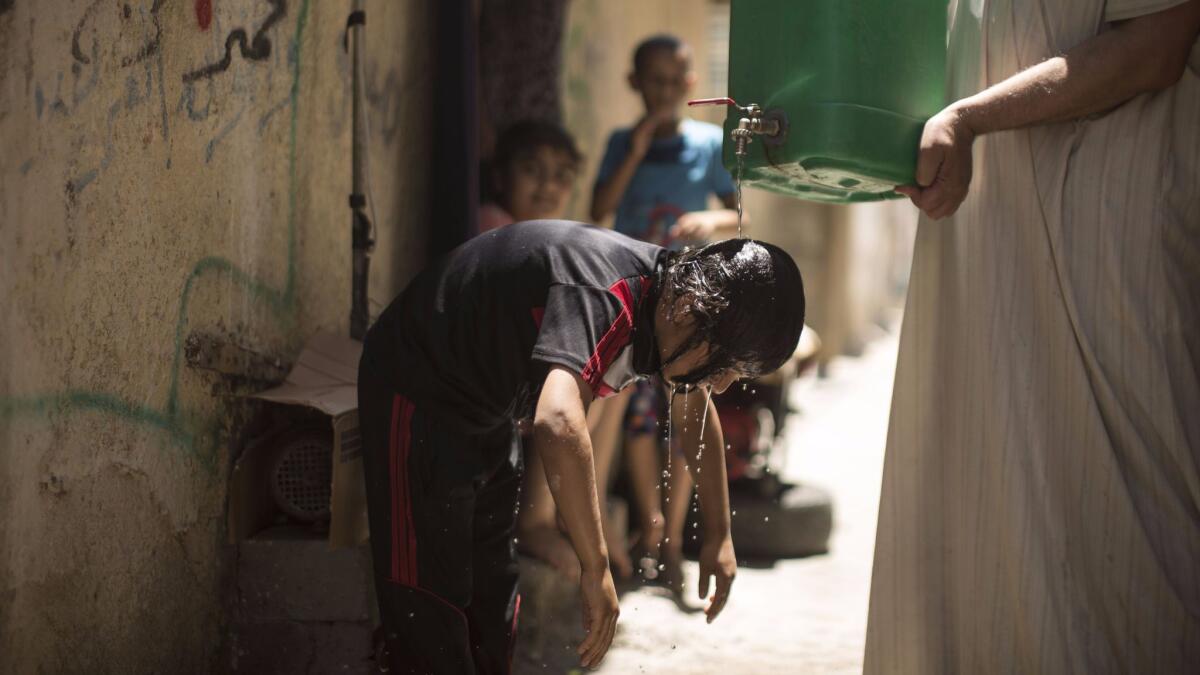Israelis and Palestinians agree to water deal to help communities suffering chronic shortages

- Share via
Reporting from TEL AVIV — Israeli and Palestinian officials said Thursday they had agreed to a water-sharing plan to help Palestinian communities suffering chronic shortages, a goal included in a broader 2013 deal that involves Jordan.
The water agreement was crucial for residents of the Israeli-occupied West Bank and the Gaza Strip, officials and analysts said.
“This will reduce the suffering of the Palestinian people, which has been worsened by the beginning of summer and the crises that they are living through,” said Mazin Ghunaim, head of the Palestinian Water Authority.
The announcement was made during a visit by U.S. Middle East envoy Jason Greenblatt, who officials credited with mediating the water agreement. The Trump administration appointee has also conducted meetings with Israeli Prime Minister Benjamin Netanyahu and Palestinian Authority President Mahmoud Abbas in recent months to try to revive the moribund peace process between the two sides.
“When you focus on the issues and not on history and background, or personal emotions, or other disturbing elements, the common denominator is much bigger than what separates us,” said Tzachi Hanegbi, Israel’s minister for regional cooperation.
The agreement announced Thursday is part of a broader water sharing deal that includes Jordan. The plan envisioned drawing water from the Red Sea to a new desalination plant in the Jordanian port of Aqaba and then moving some of the fresh water to the neighboring Israeli city of Eilat. In return, Israel would boost supply to Jordan’s north from the Sea of Galilee. The plans also call for sending brine from the Aqaba plant through a pipeline to help alleviate the evaporation of the Dead Sea.
The Israeli-Palestinian component completed Thursday calls for Israel to sell more water — up to 8.7 billion gallons annually — at a reduced rate to the Palestinian territories, about two-thirds to the West Bank and the rest to the Gaza Strip. The shortages are so acute that most of the groundwater is not fit for drinking and the additional water is considered a fraction of what is needed. The deal will double Israel’s supply to Gaza and boost the amount to the West Bank by a third.
Some peace process analysts suggested that the sides should focus on piecemeal agreements like Thursday’s deal that will improve the lives of Palestinians in the near term and build confidence to eventually reach the “ultimate” peace deal that would create a two-state solution for Israelis and Palestinians.
Many analysts said that the gap between Israel’s right-wing government and the Palestinian Authority is too large to bridge, and that another failed effort at negotiating a comprehensive peace deal might do more harm than good.
“It is impossible to reach a grand bargain over the major outstanding issues like Jerusalem, refugees and borders, so instead of trying and failing again, the two sides should focus on what can be done in the immediate future through incremental measures,” said Oded Eran, a former Israeli ambassador to Jordan.
“You create a better atmosphere and a constructive relationship, and build on that to build not only goodwill but to show benefits between the sides,” Eran said.
Palestinians, however, are deeply suspicious that interim agreements on economic issues will be used by Israel as a salve to indefinitely delay progress on a statehood deal.
The water agreement comes as the humanitarian situation in the Gaza Strip has deteriorated in recent days, where a shortage of power has caused daylong outages amid a summer heat wave.
The crisis began last month when Israel, complying with the Palestinian Authority’s decision to cut funding for electricity in coastal strip controlled by the rival Hamas faction, cut its supply to the strip almost in half. Supply is about one-fifth of demand, and residents are getting about three hours of power followed by 24-hour breaks. Power lines to Gaza from Egypt, meanwhile, have not supplied electricity since last week.
“Generators, which are running ragged from overuse, cannot compensate but are the only thing keeping Gaza hanging by a thread in the face of a full-on humanitarian disaster,” Gisha, an Israeli human rights group monitoring the Gaza crisis, said in a statement.
The group noted that the lack of power is affecting businesses, homes, hospitals and water desalination and purification facilities.
The boosted water supply to Gaza from Thursday’s water deal will ease the risk of a cholera and typhoid outbreak, said Gidon Bromberg, the Israeli co-director of EcoPeace Middle East, a organization created by Israelis, Jordanians and Palestinians.
Greenblatt expressed hope that the water deal would serve as a harbinger for improved relations, though he declined to answer reporters’ questions on his shuttle diplomacy to restart the peace talks, saying that deal is “not connected” to the broader negotiation process.
Mitnick is a special correspondent.
More to Read
Sign up for Essential California
The most important California stories and recommendations in your inbox every morning.
You may occasionally receive promotional content from the Los Angeles Times.










